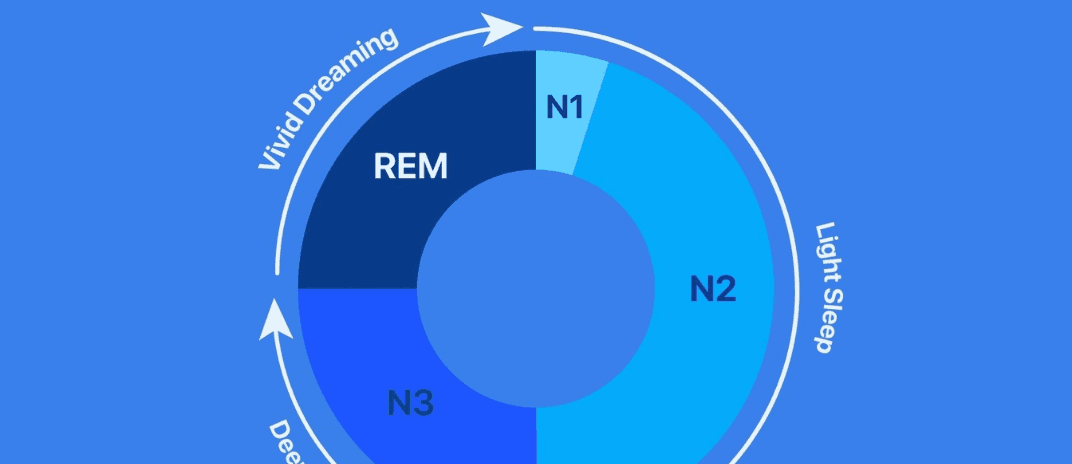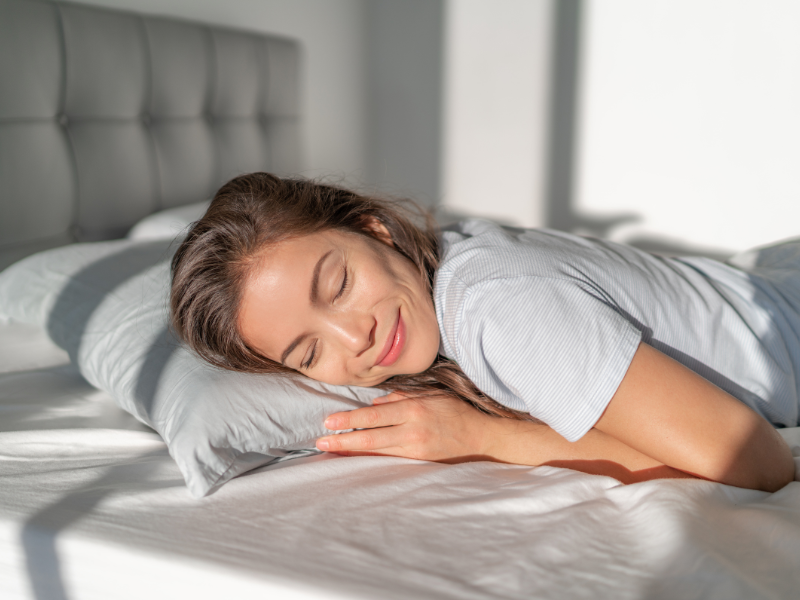


Sleep disorders can disrupt the normal flow of sleep cycles, where each stage serves a specific role in promoting restorative sleep.
Sleep is like a superpower, and for good reason! It’s during sleep that our bodies undergo essential processes. We’re always advised to rest when we’re sick because this is when our bodies repair themselves and our immune system gets stronger. Plus, during sleep, our brains organize important information, enhancing our ability to learn.
But here’s the thing: sleep isn’t just one long activity. It’s made up of different stages, like chapters in a book that we call “stages of sleep” or “sleep cycles”. There are 4 stages of sleep and all of them play a crucial role in ensuring that you wake up feeling rested and refreshed.
There are four stages of sleep and they are divided into two categories: REM sleep and non-REM (NREM) sleep. The first three stages are non-REM sleep, and stage four is known as the REM sleep cycle, associated with dreaming. As the division suggests, the stage four, the REM cycle, is the most different from the others.
| Sleep Stage | Type of Sleep | Typical Length | Characteristics |
|---|---|---|---|
| Stage 1 | NREM | 1-7 minutes | Lightest sleep period, easy to wake from, often disturbed by slight noises |
| Stage 2 | NREM | 10-25 minutes | Deeper sleep, harder to wake from compared to Stage 1 |
| Stage 3 | NREM | 20-40 minutes | Deepest NREM sleep, hard to awaken from, period of restorative sleep |
| REM Sleep | REM | 10-60 minutes | Associated with dreaming, rapid eye movement, deepest and most restorative sleep stage |
These NREM sleep stages are structured so that each progressively leads to deeper levels of sleep, with NREM Stage 1 being the lightest and Stage 3 being the deepest. As we move from one stage of NREM sleep to the next, the body undergoes more significant physiological changes, such as slower breathing, reduced heart rate, and decreased brain activity, facilitating the repair of tissues, muscle building, and immune system strengthening.
Stage 1, also called N1, is the lightest sleep cycle and is relatively short. It is straightforward to wake up from this NREM sleep stage, often known as “light sleep“. Any slightest sound can wake you up.
During this stage, also called N2, brain activity begins to slow down, and the body starts to relax more deeply, preparing for deeper stages of sleep. As the sleep is deeper, it is harder to wake from this stage. This stage is critical for cognitive restoration and memory consolidation. It’s a transitional phase where the body reduces its temperature and heart rate, setting the stage for the deep sleep that follows.
In this stage, called N3 or more frequently, “deep sleep“, the sleep is the deepest. It is the most difficult to wake up while being in the stage three. You might experience impairment for up to an hour if you wake during the deep sleep cycle.
REM Sleep is the stage associated with dreaming and is physiologically the most different. Rapid Eye Movement (where the name comes from) and muscles of the diaphragm, the body is relaxed, and dreaming takes place.
During REM sleep, there is also a temporary paralysis of the skeletal muscles, preventing us from acting out our dreams. Your heart rate slows down, which is when you get the most restorative sleep.
The most important stage of sleep is often considered to be REM (rapid eye movement) sleep. During REM sleep, the brain is highly active. This is also when the dreaming occurs. This stage is crucial for various cognitive functions, such as memory consolidation, emotional processing, and learning. Plus, REM sleep plays a vital role in regulating mood and overall mental well-being.
While each stage of sleep is essential, REM sleep is especially important for cognitive function and emotional regulation.
A healthy sleep cycle refers to a healthy and balanced pattern of sleep stages that allows for restorative sleep.
In a typical sleep cycle, During sleep, the body goes through different stages multiple times. Usually between 4-6 times.

The trick is that each cycle has a different proportion of time asleep in each stage. For example, as the cycles progress, the stages get longer, and you begin to spend more sleep time in the REM phase and less time in the other three stages.
Stage 1 usually lasts 1-5 minutes, making up around 5% of the total cycle. Stage 2 increases with each cycle and eventually accounts for 45 to 55% of the total sleep episode. The most significant change comes from REM sleep, with the initial cycle having only 10 minutes and the final cycle lasting up to an hour.

Each sleep cycle typically lasts around 90 minutes, but this duration can vary. Some stages of sleep may extend up to 2 hours, while others might be slightly shorter, lasting just over an hour. Your circadian rhythm helps regulate the timing of these cycles, determining when you enter different stages of sleep.
Throughout the night, your body generally goes through sleep cycles approximately 4-6 times. For adults, this translates to aiming for 6-9 hours of sleep each night.
Therefore, it’s crucial to allocate a sufficient amount of time for sleep to ensure your body can complete multiple cycles and participate in each stage of the sleep cycle effectively.
The stage of sleep that is hardest to awaken from is typically deep sleep, also known as N3 sleep. During this stage, the body and brain are in a state of deep relaxation and restoration, making it more difficult to wake someone up.
During the REM sleep stage, your brain and body already have some energy to show you some dreams. This stage is also involved in storing memories, learning, and balancing mood. So, the deeper this stage is, the more things come “on the surface” of your brain, motivating dreams, and eventually, you will be a great speaker! Read this article to learn more about sleep talking and how to stop it.
To effectively track your sleep cycles, consider using the ShutEye® app, which stands out as the only one on the market with patented sleep tracking technology. Unlike other apps, ShutEye® doesn’t require any wearable devices to function. Clinically proven for precision, it achieves over 90% accuracy, comparable to professional sleep studies such as polysomnography. Easy to use, simply place your phone near your bed and activate the tracker. Receive personalized insights into your sleep patterns and stages by morning.
Neither is “better” than the other. Both REM (rapid eye movement) sleep and deep sleep (also known as slow-wave sleep or N3 sleep) are crucial for health and well-being.
REM sleep is essential for cognitive functions such as memory consolidation, handling emotion, and learning. REM sleep is also associated with creativity and problem-solving. Finally, the dreaming happens in the REM stage.
On the other hand, deep sleep is crucial for your body to recover and heal, such as fixing muscles, boosting immunity, and keeping hormones balanced. It’s essential for your overall physical health.
It’s not a matter of one being better than the other, but rather the importance of achieving a balance between the two for optimal sleep quality.
If you want to get the most out of REM sleep, try to follow at least some of the following recommendations to improve your sleep hygiene:
Try to wake up and go to bed at the same time, even on weekends or holidays. It will automatically create an inner schedule for your body. Remember, for the body, it is not easy to adjust quickly to a new schedule. Click here to get some tips for better sleep.
Shut off your TV, tablet, computer, and smartphone. At least keep these devices out of emitting light. Otherwise, it will stimulate your brain, suppress the production of melatonin (which encourages REM sleep), and interfere with your body’s internal schedule.
Use heavy curtains or shades to block the light from windows. Cover any electronic displays, like TV or computer, so the light does not glow in the room. You can also use a sleep mask to cover your eyes and create a dark space that will help you sleep. If you have difficulty sleeping due to loud noises outside your window or a loud sleep partner, consider investing in good earplugs or a noise machine. Check out what Olympic Athletes think about sleep and how they deal with it. The most trustworthy source of knowledge.
Caffeine is a known stimulant that can suppress your REM sleep and can be found in coffee, chocolate, soft drinks, non-herbal teas, diet drugs, and some pain relievers. Alcohol is also affecting your sleep, and it can prevent you from going into a deep sleep stage. It will keep you in the lighter stages of sleep, causing you to possibly wake up easily and have a more challenging time falling back asleep.
Many kinds of essential oils would do good for your sleep. They are like a natural and healthier sleep medicine. Find out more at our guide dedicated to aromatherapy. With this guide, you will become the best essential oils keeper that even barmen will envy.
You may also like:
What Is REM Sleep Behaviour Disorder? How To Treat It?
Learn more about:
How to Increase Deep Sleep? 8 Tips for a Restorative Night
How much deep sleep do you need?
How much deep sleep do you need by age?
All the sleep stages are important. None should be ignored, as they all work together for our well-being. Remember, our sleep cycles repeat throughout the night, so it’s crucial to prioritize quality sleep. Don’t underestimate the power of sleep—it’s our best free remedy. Let’s focus on improving our sleep for a better day ahead.
If you’re interested in sleep stages, explore ShutEye®—an app that simplifies sleep improvement. With our advanced sleep-tracking technology, you can monitor all your sleep stages effortlessly.
Institute of Medicine (US) Committee on Sleep Medicine and Research; Colten HR, Altevogt BM, editors. Sleep Disorders and Sleep Deprivation: An Unmet Public Health Problem. Washington (DC): National Academies Press (US); 2006. 2, Sleep Physiology. Available from: https://www.ncbi.nlm.nih.gov/books/NBK19956/
Patel AK, Reddy V, Shumway KR, et al. Physiology, Sleep Stages. [Updated 2024 Jan 26]. In: StatPearls [Internet]. Treasure Island (FL): StatPearls Publishing; 2024 Jan-. Available from: https://www.ncbi.nlm.nih.gov/books/NBK526132/
Kirsch, D. (2021, November 8). Stages and architecture of normal sleep. In A.F. Eichler (Ed.). UpToDate., Retrieved December 6, 2022, from https://www.uptodate.com/contents/stages-and-architecture-of-normal-sleep
Yetton BD, McDevitt EA, Cellini N, Shelton C, Mednick SC. Quantifying sleep architecture dynamics and individual differences using big data and Bayesian networks. PLoS One. 2018;13(4):e0194604. doi:10.1371/journal.pone.0194604